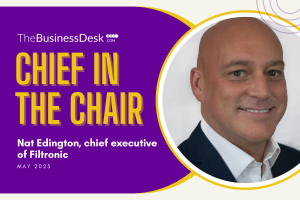QE possible if economy ‘deteriorates’, says MPC’s Weale

BANK of England Monetary Policy Committe member Martin Weale has told TheBusinessDesk.com that a double dip recession “isn’t impossible” as he hinted that the quantitative easing programme could be restarted.
Speaking following an event organised by Doncaster Chamber of Commerce, Mr Weale also explained why he had changed his vote at this month’s MPC meeting from his previous standpoint of campaigning for a rise in interest rates.
Mr Weale used the speech to say there is “undoubtedly scope” for the Bank’s quantitatve easing programme – which saw a £200bn portfolio of government bond assets acquired in the first round to help expand the supply of money into the economy and meet the inflation target – to be extended.
However, he said although the Bank would be in a position to support the economy with further asset purchases, there was no requirement at present to introduce QE despite inflation running at more than double the Bank’s target.
Speaking to TheBusinessDesk.com, Mr Weale said: “I think in the short term the key message is that the Bank of England remains concerned about inflation and about inflation being off target but we do think, and I have changed my mind on this, that it can be brought back to target without an early increase in interest rates being desirable.
“The other thing that I would like to try to communicate is that although at the moment I don’t think there is a case for further monetary stimulus, more quantitative easing, if the economic situation did deteriorate then this is something I’m sure the Bank would do.
“People’s concerns that interest rates are so low that it would now have no impact I don’t think are born out if you look at the full range of interest rates and not just the relatively short term interest rates.”
In his speech, Mr Weale said that while bond yields are at historic lows, a new round of quantitative easing could focus on buying longer-dated government loans, helping to push down long-term interest rates, and increasing the price of other assets, such as shares.
“There is undoubtedly scope for further asset purchases to trigger further reductions in yields on government debt should the need arise,” he told the audience.
Asked by TheBusinessDesk.com for his thoughts on the growth prospects for the UK economy, Mr Weale said: “There’s a wide range of uncertainty. My expectation is that the growth rate will improve towards its long-term trend and of course then you have to remember that even if the economy is growing at its long term trend it’s still not making up the ground that was lost in the aftermath of the recession.
“So even trend growth would still be a disappointment if you imagine where we would have been without the crisis.”
He also said that although the chances of a double dip recession was not his “central expectation”, “at the same time I could never say that it’s impossible”.
Explaing his move as one of two MPC hawks previously advocating an increase in interest rates to vote against a rise, he said: “In the first half of the year it appeared that a fairly sharp increase in interest rates would be needed to bring inflation back to target over a two to three year period and there was a question of whether it was sensible to follow the pattern of interest rates shown in the market and whether it was sensible to start a bit sooner and I thought it was sensible to start a bit sooner because if things were worse than you’d feared at least you had made a start and if they turned out better than expected then you needn’t go on putting the interest rate up.
“Now, by the time we’d got to the August meeting and the forecast had been prepared then, the international environment seemed a bit weaker and the problems in the Euro Zoee area seemed a greater source of concern than they had appeared earlier and in the light of those factors it seemed to me it would be wrong to increase the interest rate by a quarter point.”
He also told the audience that a further drop in the interest rate from 0.5% was unlikely.
In a research note following the speech, Chris Crowe, an economist at Barclays Capital, said Mr Weale was “more than ready to join a coalition in favour of renewed asset purchases should the outlook deteriorate significantly”.
Mr Weale also used his speech to state that the UK economy had been given a “silver lining” following a drop in oil prices. This could help the consumer price index inflation rate drop which could be further lowered if the fall in oil prices feeds through to energy prices and utility bills.
Mr Weale also noted that household consumption may need to fall by about 10%, since he argued Britons had not been saving enough during the economic downturn.







